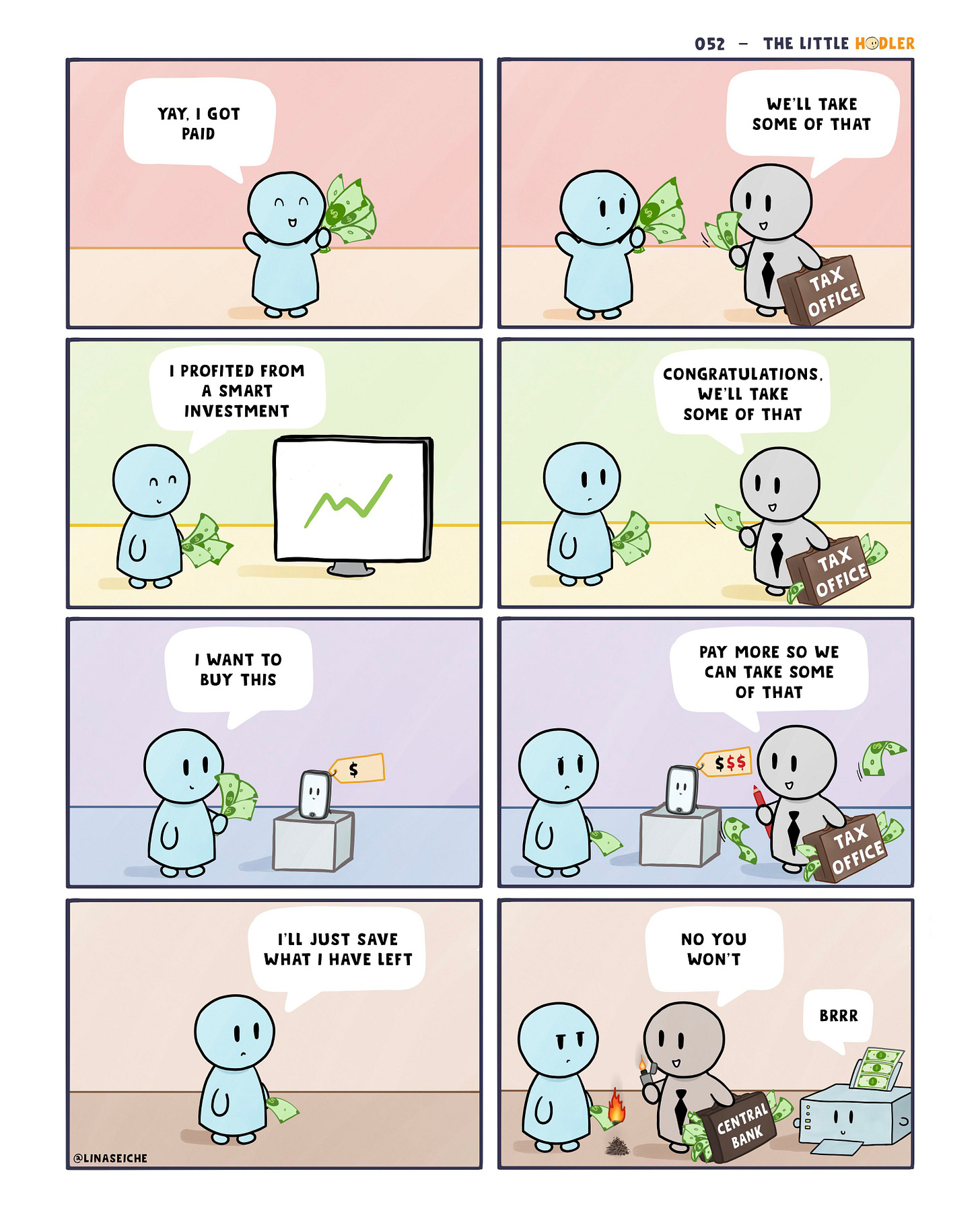Bitcoin Tech Talk #435
Interesting Stuff
Avoiding Hard Questions - The article is about the main cognitive bias that we have which is that we don’t like answering hard questions and instead substitute easier questions in their place. There are many good examples in the article, but I suspect that the application is much, much wider than even the author suspects. Keynesian economists, for example, will answer easier questions about numbers and math equations than something hard like “what are the unseen effects of monetary expansion?” I suspect that the lack of first-principles thinking is a phenomenon closely related to propaganda, which is unfortunately super-charged in a fiat economy.
Jordan Peterson Conundrum - There are critics of Jordan Peterson from both the left and the right, many of which are valid but this one struck close to home because it’s from a Christian perspective. Essentially, the author argues that JP dances around the issue as much as he can to avoid actually confronting who Christ was. I’ve found this frustrating about him as well, as he psychologizes and turns into metaphor all the claims of Christianity rather than dealing with the question head-on. It’s a form of intellectual cowardice that I pray he gets out of, but is all too common among academics.
Overcoming Despair - The article is by an educator and Classicist. As he writes, young men have it hard these days. The careers that they’re shepherded towards are little better than corporate slavery and don’t pay much to boot. The loans they’ve accumulated make it hard to start a family and status in particular is very difficult to get with all the boomers refusing to leave their positions. Yet the black pill is not the way to go and submitting to the rigged status game is not going to be satisfactory. What everyone wants is a different path and it’s away from fiat money.
Bureaucratic Idiocy - The article is about the push to open a casino in Chicago and all the stipulations, well-intended or not, which have resulted in a red tape nightmare. The financial tricks themselves are mind-boggling, but the real gem is in the terms of the offering, which for weird DEI reasons has to be bought by minorities within the city. Essentially, the investment vehicle will screw these people out of their money through some really nasty tricks. I knew the bureaucratic sausage was messy, but learning about this is several levels beyond what I’ve ever seen or read about.
Free Trade Critique - Readers of this space know that I’m a proponent of the Austrian school of economics. Part of the philosophy of the school is that free trade is an unmitigated good and until I read this article, I would have said the same. But there are some really good points made in the article, particularly with respect to Ricardian Comparative Advantage which I found very compelling. There’s an Austrian response to the article here, but as the article admits, if capital and labor flow out, the jurisdiction essentially dies an economic death, which isn’t a good fate for any nation. Are there good justifications for tariffs? I’m not sure, but it’s worth thinking through the secondary effects of free trade, like the lack of development when the good produced is not particularly advanced.
What I'm up to
Bitcoin Group - I was on the long-running World Crypto Network show to talk about the issues of the past week. We talked about Coinbase, San Francisco, Mark Cuban, Strategy and what’s been going on with DOGE. It’s been a while since I’ve had to have quick takes on things, and it was fun to talk about some of these Bitcoin-related news items.
Programming Blockchain - My two-day seminar will be in Austin March 31-April 1! If you want to be a Bitcoin developer, this is the course that’s helped hundreds of people to get into this industry. I will not be running this course as this will be the final one.
Palm Beach Atlantic University - I will be speaking at this university on March 27th. Details to come but rest assured, I’ll be talking about Bitcoin to a bunch of college students.
Nostr Note of the Week
What I’m Promoting
Bitcoin
Blocksize Report - The mempool.space crew has produced a thorough report of the evolution of blocksizes, from the 1MB limit pre-segwit to the 4MB weight limit after. There’s a lot here, but the main finding is that block space often isn’t completely an economic calculation and there have been smaller blocks than transaction demand would indicate. Further, the inscription stuff starting in 2023 has significantly increased blockspace usage, which if current trends are anything to go by, may wane again as that protocol sees less money being poured into it.
Erlay Implementation Details - The idea of Erlay has been around for a few years, where instead of using inefficient inv and getdata messages to transfer missing transactions for any given connected nodes, there’s some sort of set reconciliation to make the data transfer significantly less. Of course, nothing comes for free and there’s some pre-calculation involved and the details of that calculation and set resolution are what this post on Delving Bitcoin is about. There are important considerations like fanout, which is how many peer nodes a new transaction is sent to and so on.
PayJoin Progress - Spiral has a blog that’s highlighting some of the grants that they’ve given out, affectionately called Nerd of the month. This month, it’s PayJoin and they share the progress that’s been made on PayJoin Dev Kit (PDK), Bull Bitcoin’s integration with PayJoin and plans for an LDK PayJoin integration. The privacy and fee benefits of this protocol are compelling for any frequent transactors, and as we move toward more transactions in general, this sort of tech will be essential in ensuring self-sovereignty of users over their own coins.
Lightning
Force Channel Closure Vulnerability - This is a vulnerability that was responsibly disclosed for LDK versions 0.1 and below. There’s a way to force a channel closure due to the HTLC validity checking logic of LDK and though the attacker must give up funds in whatever channels that are used in the attack, in practice, the attacker can spend down the channel very low as to cost almost nothing. Thankfully, it’s been patched as of 0.1.1.
Paywally - Lightning paywalls have been around a while, but this is the first one I’ve seen that uses Cashu to bootstrap content-creators. As what you get is cashu e-cash, you don’t need a lightning channel and the actual sats are sent via Nostr as an e-cash token which can be redeemed for Bitcoin by the mint. It’s definitely more friendly toward those that haven’t used Bitcoin before and I suspect that we’ll see some sort of integration between this concept and paywalled posts on Nostr before too long.
Spark - This is a different L2 than Lightning, but in a sense, it can almost be considered an L3 because it allows users to deposit and withdraw from the system using Lightning invoices. As with Lightning, you can withdraw funds unilaterally on-chain and the main risk seems to be very time-limited. The details are all in the link and there’s already a company that’s raised money to create a DEX on it called Flashnet.
Economics, Engineering, Etc.
Lana - This is a new product from Galoy to enable Banks to make Bitcoin-based loans. Given the revocation of SAB 121, which now allows banks to custody Bitcoin for customers, this seems like a logical product to create for Bitcoin holders. After all, banks lend out newly printed money for all kinds of assets, most much less liquid than Bitcoin. The availability of relatively low interest loans with Bitcoin collateral should mean that there will be a lot less selling of Bitcoin, but at the same time, it may tempt banks to loan out the Bitcoin with a fractional reserve. Time will tell if this is ultimately a good or a bad thing for Bitcoin.
Debasement and Birth Rates - Monetary debasement and low fertility rates are a universal reality throughout the developed world and a significant chunk of the developing world. Could they be related? As the article points out, Rome had a correlating debasement and fertility drop and it does seem like there’s a correlation today as well, except instead of the process taking hundreds of years, it seems much more accelerated in modern day. Fiat ruins fertility.
Breez Payment Report - As might be expected from the Lightning Wallet provider, this is a global report on lightning adoption and Bitcoin’s usage as payment. The report claims that the lightning network reaches over 650M people, which is just below 10% of the world population, which seems a bit high. That aside, there is a lot of good information here, like how payments are used, where they are used and examples of integrations in different industries.
Quick Hits
CoinOs Breach - The Web wallet had a security incident affecting about 80 wallets.
Mempool Clears - It’s been a while, but some blocks were not full because the mempool was clear.
Strategy - MSTR is now Strategy.
Android Malware - Now they’re writing Malware that steals Bitcoin by looking for seed phrases in your photos.
Fiat delenda est.







